What is Global Privacy Control (GPC) – A Beginner’s Guide

Have you ever been bombarded with demands for permission to track your online activity? Do you want to know how to control privacy in today’s digital world? A growing Global Privacy Control (GPC) initiative may hold the answer.
GPC is a browser setting that alerts you about privacy requirements. Adopting a universal opt-out signal provides a simple answer for a more convenient and complete privacy experience.
This guide dives into what GPC is, its importance for your business, the impact of regulations like CCPA and CPRA, and how to implement GPC on your website.
Let’s see how GPC empowers your online privacy and ensures compliance with the ever-evolving landscape of privacy regulations.
What is Global Privacy Control?
GPC, short for Global Privacy Control, is a technical specification for transmitting universal opt-out signals. In other words, it’s a web browser setting informing every website you visit about your privacy choices. The website’s operator must honor and comply with your opt-out preferences.
This makes it easy to protect online privacy across several websites and services. It offers individuals a practical strategy for exercising and respecting their website privacy rights.
When a user specifies and recognizes his preferences through GPC, the website excludes the visitor from targeted advertising and any activity involving selling or exchanging personal information.
It offers a potential solution to bridge the gap between user expectations and internet data use as privacy concerns grow and adapt in the digital era.
Here’s a list of web browsers that integrate, automate, and comply with GPC settings:
- Brave browser
- DuckDuckGo Privacy Browser
- Mozilla Firefox
- Abine
- Disconnect
- lockrMail by lockr
- Disconnect
- OptMeowt by privacy-tech-lab
- Privacy Badger by EFF
Note:- Google Chrome currently doesn’t support GPC.
Why is Global Privacy Control Important for Your Business?
It’s more crucial than ever to understand global privacy control (GPC) in the era of digital marketing. GPC is a tool for you and your business to comply with privacy regulations in a simpler way.
It offers a standard approach for users to request that their data not be shared without needing to individually inform websites, devices, and other software about their privacy preferences.
Under the CCPA and GDPR, many website hosts do not sell or object to processing links to meet their respective privacy requirements.
This is where GPC comes in. It provides a one-stop solution for exercising your privacy rights and indicating that you do not want your data sold or shared.
According to a Norton study, 71% of adults worldwide have taken measures to protect their information online. Implementing GPC shows that your business is transparent and respectful of user data.
GPC streamlines procedures for your business and may reduce expenses by automating individual user opt-out requests without hassle.
It’s also future-proof, as it can comply with ever-evolving privacy regulations like GDPR and CCPA, allowing you to avoid potential lawsuits.
To sum up, GPC offers businesses
- To Comply with Laws and Regulations.
- To Simplify Processes.
- To Maintain Competitiveness
- To Build Customer Trust.
- To Reduce Costs.
What is CCPA?
The California Consumer Privacy Act is a law that protects the privacy of people in California. It was enacted in the year 2018.
The CCPA protects the rights of California residents by providing them with transparency over their information. They’ll have the right to know, request deletion, and opt out of selling their personal information.
The CCPA applies to for-profit companies that collect personal information from California citizens, have gross revenue of at least 25,000 dollars, and gather user data on at least 50,000 consumers, households, or devices.
What is CPRA?
The California Privacy Rights Act builds upon The CCPA and further strengthens consumer privacy rights. It’s a ballot initiative passed by California voters on November 3, 2020.
CPRA provides the right to opt out of specific users and disclosures of “sensitive personal information” such as social security numbers, driver’s license numbers, passport numbers, or debit/credit card numbers.
The residents have the right to correct inaccurate personal information and have clear information about business practices, including data retention periods.
How Does CCPA and CPRA Impact Global Privacy Control
The CCPA and CPRA play an essential role in developing and implementing Global Privacy Control (GPC) in several ways, including laying legal foundations and setting precedents for other nations by demonstrating its effectiveness, driving industry adoption, and many more.
GPC corresponds with the CCPA’s fundamental functionality by allowing users to opt out of selling their personal information. It has set the precedence for other areas and countries to pursue similar legislation.
The privacy obligations of both Californian legislation pushed the companies to implement GPC compliance mechanisms. This may encourage efficient compliance with growing legal requirements.
GPC can assist businesses in California in automating their opt-out process, ensuring that user preferences are respected promptly and effectively. This ensures that people’s privacy decisions are respected right away.
Does GDPR Impact Global Privacy Control?
GDPR, short for General Data Protection Regulation, has a solid impact on GPC. It says that any individual shall have the right to withdraw consent at any time.
Withdrawing consent should be as simple as giving it. Once the business has your information, you can submit requests. No matter how the request is submitted, the business must honor it.
As a result, all businesses must adhere to the GPC signal. It notifies the controller that you have withdrawn your consent to the processing.
One effective way to implement GPC on your website is to use the WP Cookie Consent WordPress plugin.
How Do You Implement Global Privacy Control Using WP Cookie Consent
Now that you understand the significance of implementing Global Privacy Control let’s read about the WP Cookie Consent plugin and how it helps implement GPC.
WP Cookie Consent – Best Cookie Consent Banner Generator
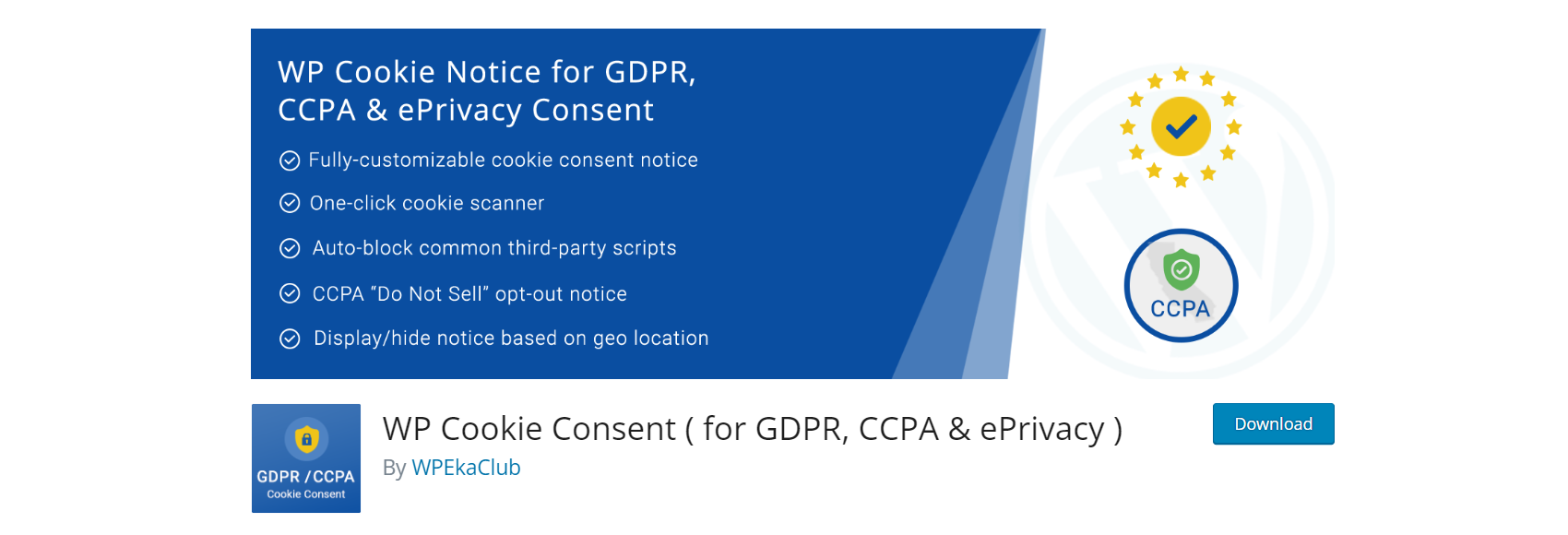
WP Cookie Consent is a powerful WordPress plugin that helps you comply with cookie guidelines without implementing expensive SaaS solutions.
This allows you to create customized cookie banners that provide clear information about the types of cookies used and their purposes. It also provides a comprehensive solution for managing cookies and user consent.
Features
- CCPA “Do Not Sell” opt-out Notice
- Geo Location
- Cookie Scanner
- Customizable Cookie Consent Notice
- Auto-block Third-party Scripts
Easy Installation and Configuration of WP Cookie Consent
Now, let’s see the installation and configuration of the cookie consent plugin.
Firstly, go to the WordPress dashboard and hover over the Plugins section. Then, click on Add New Plugin, as shown below.
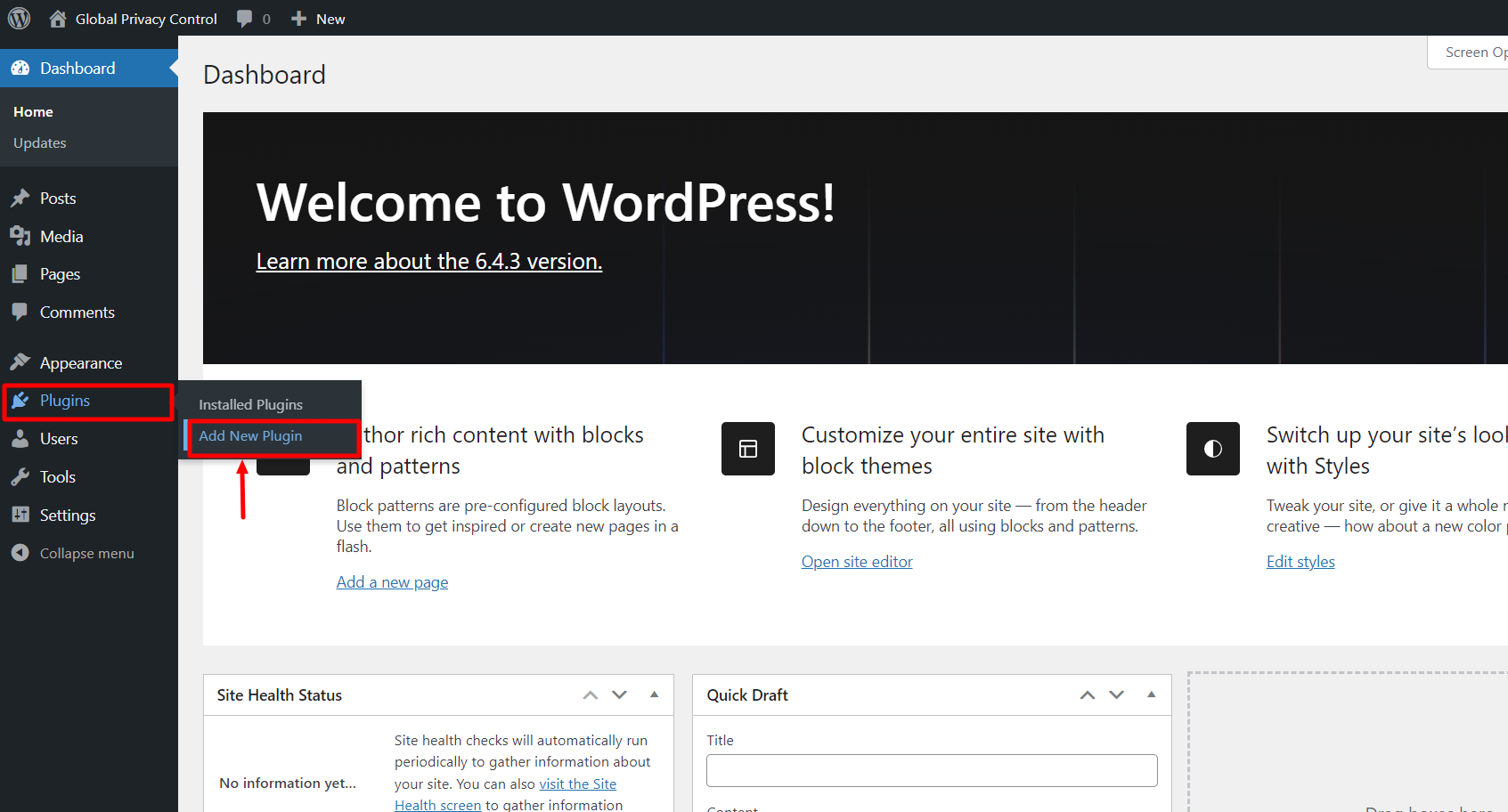
Type WP Cookie Consent in the search bar.
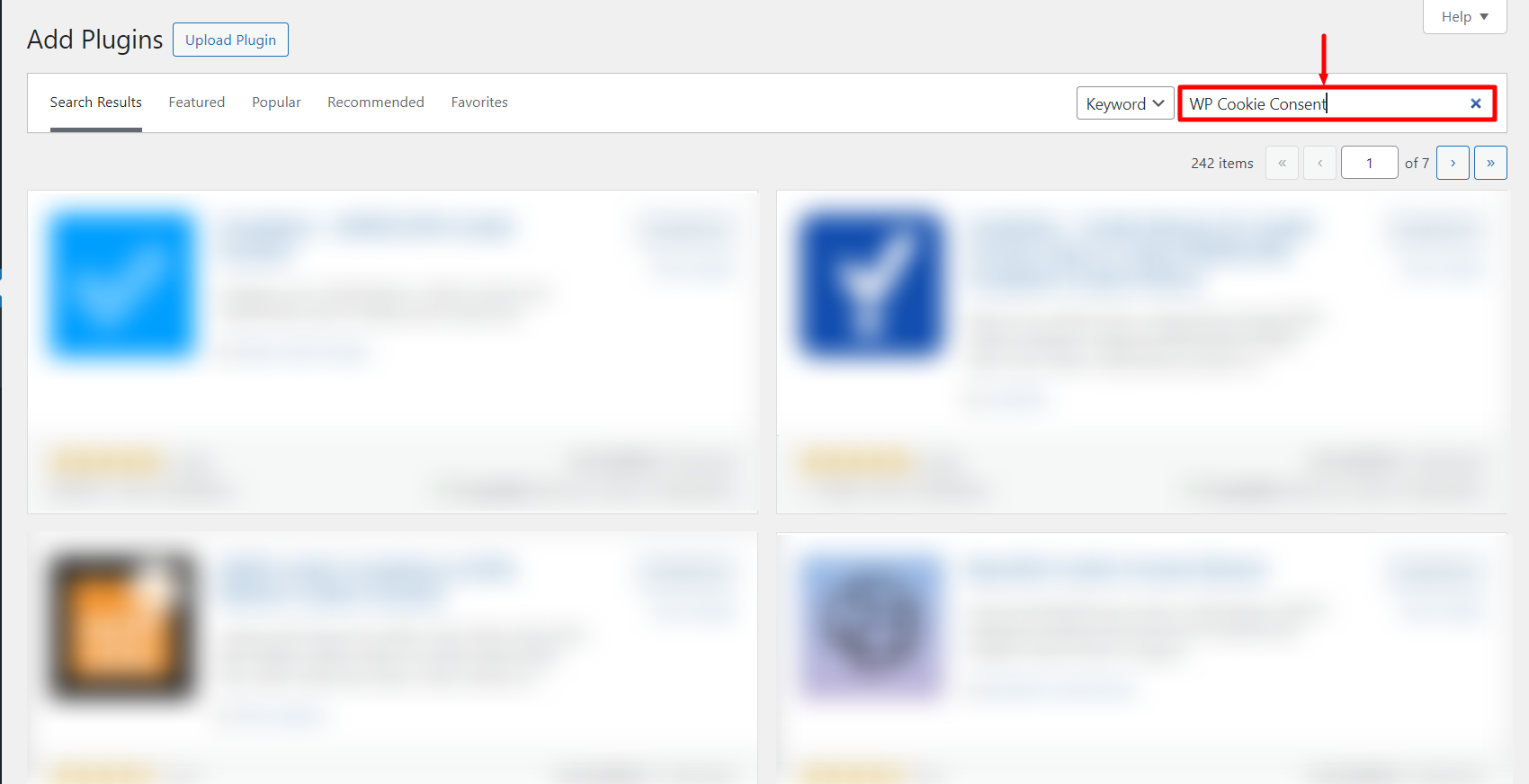
Now, navigate to WP Cookie Consent plugin and click the Install Now button.
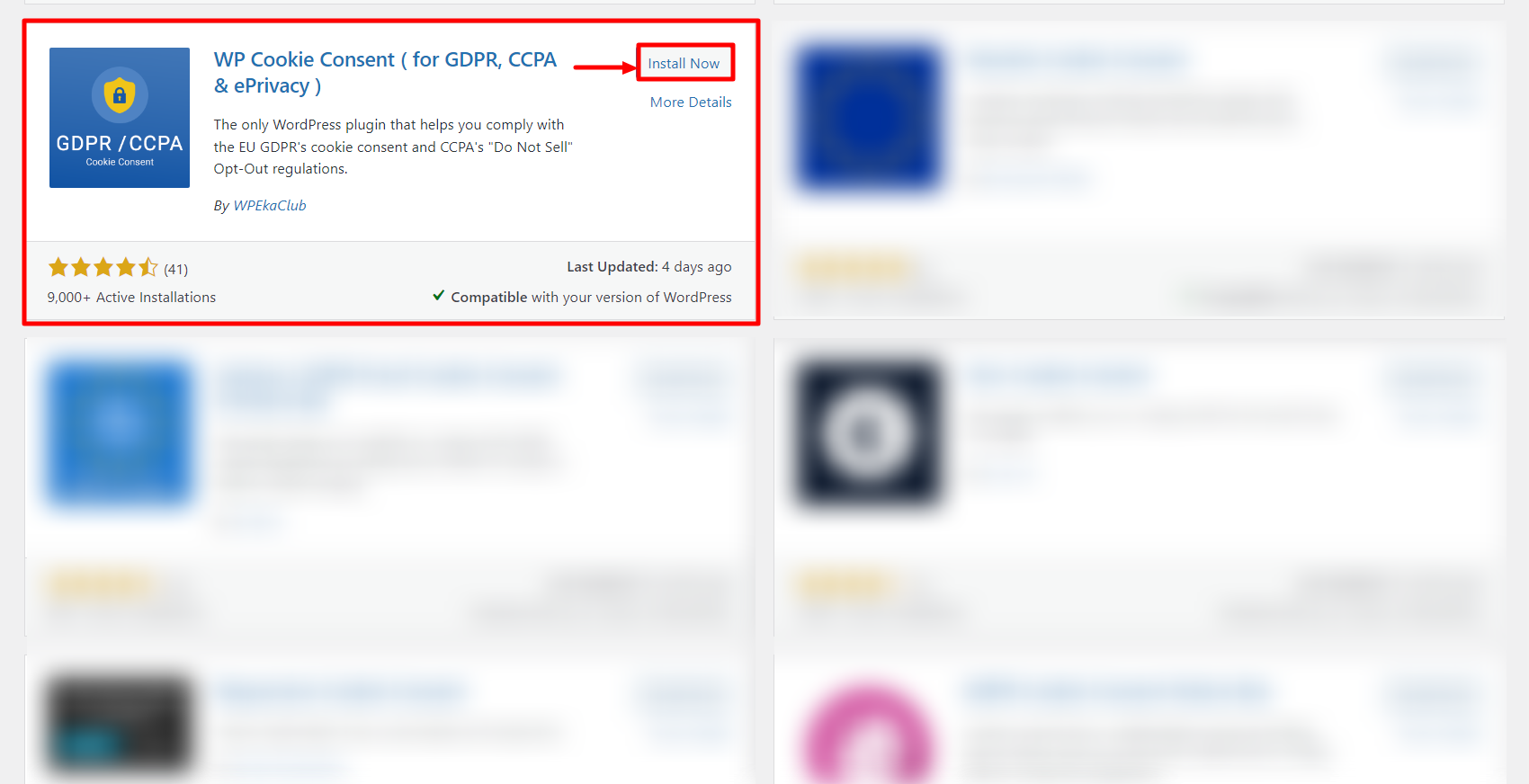
After the installation, you need to activate the plugin by clicking the Activate button.
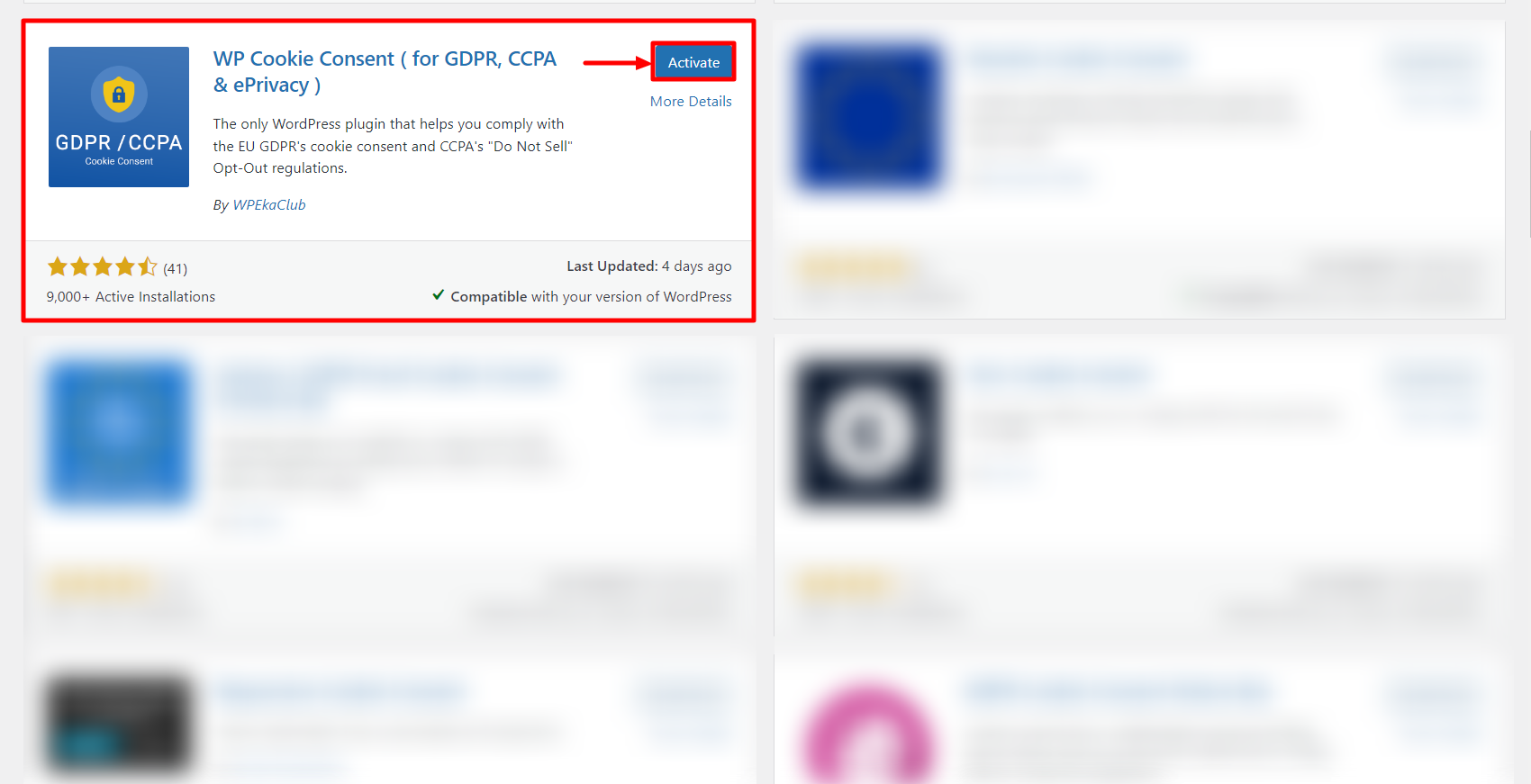
How to Implement GPC Using WP Cookie Consent
Let’s see how to implement Global Privacy Control using the WP Cookie Consent plugin.
After successfully installing the plugin, go back to the dashboard, and you’ll be able to see the WP Cookie Consent option in the menu. Click on it.
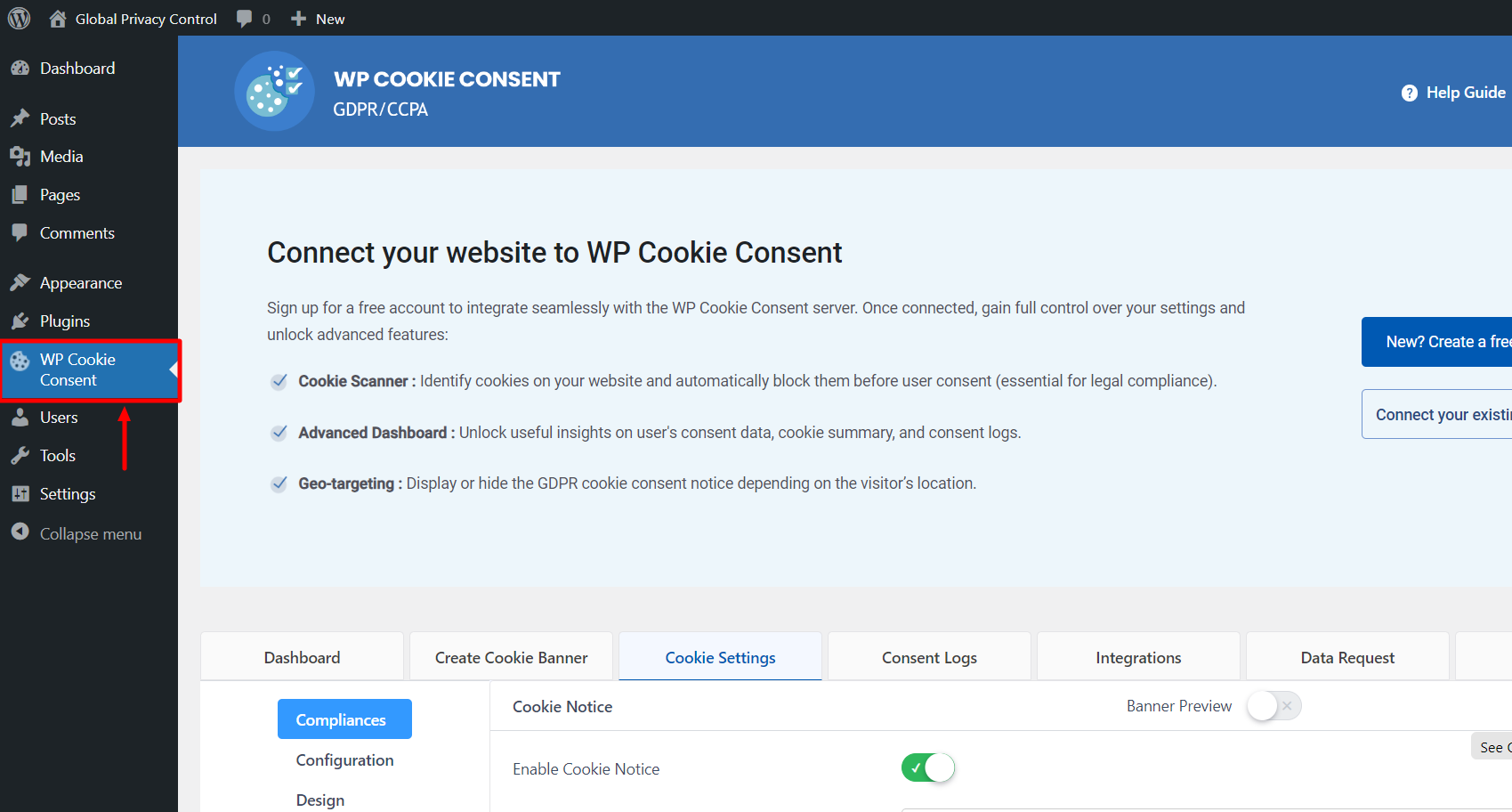
Now, go to Cookie Settings –> Consent Settings and enable the Respect Do Not Track & Global Privacy Control by turning on the toggle option.
Accordingly, make all the necessary changes and click the Save Changes button.

You’ve successfully implemented Global Privacy Control using the WP Cookie Consent plugin.
FAQ
You can enable GPC through a privacy-focused web browser that supports GPC; here are your options: Brave Browser, DuckDuckGo, Disconnect, OptMeowt, Privacy Badger, etc.
You can check your browser’s privacy settings. Navigate for options mentioning “Do Not Sell My Data” or “Global Privacy Control” and turn them on.
Websites can implement GPC with a gpc.json file (true=opt-out) or via a CMP for automatic preference handling. This process can be complex for non-web developers.
Wrapping It Up
Global privacy control is essential in safeguarding user data and ensuring privacy compliance. It proposes a possible approach to bridge the gap from user expectations towards internet data consumption.
Privacy is becoming increasingly crucial; safeguarding user data is not merely a responsibility but an obligation. With GPC’s help, users can exercise more control over their personal information. It stops fingerprinting and cross-site tracking, two important things users don’t want.
Want to read more content like this? Check out our other similar articles.
- Effective And Compliant GDPR Cookie Consent Banner Examples
- What Are Session Cookies? – A Comprehensive Guide
- What Are Tracking Cookies – A Beginner’s Guide
Get WP Cookie Consent plugin to make your website comply with all the global laws.


Leave a Reply